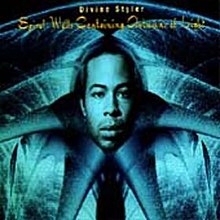Experimental hip hop
This music-related article is a stub. You can help Wikipedia by expanding it.
| Experimental hip hop | |
|---|---|
| Stylistic origins | Alternative hip hop, turntablism, acid jazz, folk, prog rock, alternative rock, electronic music, post-punk, indie rock, psychedelia |
| Cultural origins | Mid 1990s in the United States |
| Typical instruments | Vocals – turntables – sampler – synthesizer – keyboards – guitar – strings |
| Derivative forms | Underground hip hop – Trip hop – Hipster hop – Nerdcore - Industrial hip hop |
| Subgenres | |
| Avanthop, Left-field hip hop | |
Experimental hip hop (also known as abstract hip hop) is a style of breakbeat music that refers to the experimental use of hip hop elements (usually other than rapping) in ways usually unsuitable for the actual hip hop music genre. Anticon and Ninja Tune are experimental hip hop and acid jazz labels. Experimental hip hop does not usually feature rap but may feature it in small proportions or samples. Experimental hip hop is usually electronically produced and incorporates turntablism. There are many artists that introduce acoustic elements to the genre to enhance the ability of being played live (this is also notable in trip hop, and its subgenre trip rock).
Avante-garde rap
Avante garde rap is a style of experimental hip hop that retains rapping. The origin of avant-garde rap is unclear. De La Soul's 3 Feet High and Rising could very well be seen as hip hop's first experimental album for its innovative use of different samples and sounds; however, some hip hop critics say that Paul's Boutique was the first rap album to do that: this album was stated by music reviewer Robert Christgau as the earliest hip hop record he noted as to being avant-garde.[1] Today backpackers view the Anticon collective's Music for the Advancement of Hip Hop album as the first true avant-garde or experimental hip hop LP.
Notable artists

- Anticon
- Aesop Rock
- Alias
- Awol One
- B. Dolan
- Beastie Boys
- Blockhead
- Blue Sky Black Death
- Greenhouse (Blueprint & Illogic)
- Busdriver
- cLOUDDEAD
- Count Bass D
- Childish Gambino
- Danger Mouse
- Dan the Automator
- Dälek
- DOOM
- Death Grips
- Del tha Funkee Homosapien
- Divine Styler
- DJ Krush
- Doom
- El-P
- Esham
- Eyedea
- Gorillaz
- Grayskul
- Handsome Boy Modeling School
- Hoodie Allen
- Insane Clown Posse
- J Dilla
- Kid Koala
- K-The-I???
- Kay The Aquanaut
- Kno
- Kool Keith
- Madlib
- MC Paul Barman
- Mike E. Clark
- New Kingdom
- Noah23
- Odd Nosdam
- PM Dawn
- Peeping Tom
- Prefuse 73
- Prince Paul
- Qwel
- RJD2
- Rob Sonic
- Sage Francis
- Sole
- Subtle
- Themselves
- Twiztid
- The Visionaries
Production
Experimental Hip-Hop production is highly eclectic. Influence is drawn from almost every genre of music. There are elements of Electronic Music and Dub as well as the use of rock, soul, reggae, classical, and jazz samples, among many others. Experimental hip-hip production expands on the sounds of early 90s hip-hop such as The Wu-Tang Clan, A Tribe Called Quest, De La Soul, and The Pharcyde to name a few.
One of the most influential pioneers of experimental hip-hop production is James Dewitt Yancey, better known as J Dilla or Jay Dee. The two main elements of J Dilla's style included sampling and non-quantized drum rhythms. Sampling, or the use of phrases or stabs from other music, is the basis of Hip-Hop production and is a traditional technique. However, J Dilla's way of chopping samples was unique and highly innovative, mostly finding insignificant elements and small phrases in the music to turn into the main melody. Non-quantized drums are another trademark of J Dilla's style. Quantization refers to the editing technique used in programming drums wherein each drum hit in the pattern is locked to a rhythmic value on a perfect grid. While some experimental hip-hop does use quantized rhythms, the vast majority of it does not. Dilla was a pioneer of this technique and is notorious for not using quantization. He played out his drum rhythms by hand on the pads of his Akai MPC (Music Production Center). This gives his music the effect of having a natural groove or swing, as if a real drummer had played on it. Some more recent producers who are noticeably influenced by this sound, and use similar drum programming techniques include Madlib, Flying Lotus, Kareem Riggins, and Hudson Mohawke. Other legendary producers who are often cited as influences for experimental hip-hop include DJ Premier, 9th Wonder, Hi-Tek, Pete Rock, and Ali Shaheed Muhammad of a Tribe Called Quest.
References
- ^ "Robert Christgau Review". Robertchristgau.com. Retrieved 2011-02-28.
